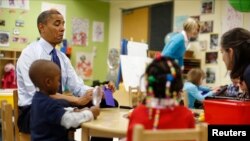WHITE HOUSE —
U.S. President Barack Obama was on the road again Thursday, seeking public support for increasing government spending on early childhood education. Obama is campaigning for the proposals he laid out in Tuesday’s State of the Union speech.
The president visited a preschool in the southern city of Decatur, Georgia, where he played games with small children and spoke to adults about the importance of early childhood education.
“Study after study shows that the earlier a child begins learning, the better he or she does down the road," said President Obama. "But here is the thing: We are not doing enough to give all of our kids that chance.”
Obama said the gap in academic achievement between poor and wealthier students in high school has its roots in children as young as three and four-years-old.
“Most middle-class parents cannot afford a few hundred bucks a week for private preschool," said Obama. "And for the poor children who need it the most, the lack of access to a great preschool education can have an impact on their entire lives. And we all pay a price for that.”
The president’s plan would enlarge the existing Head Start program, in which the government pays for public preschool for four-year-olds from low-income families. The federal government and all 50 states would fund the expanded program.
Obama wants to let communities and child care providers compete for grants to serve children ages three and younger.
White House officials say the president will detail how much the program will cost when he sends his 2014 budget proposal to Congress in March.
Obama’s second term agenda includes redesigning and improving America’s high schools, and more government help in paying for college.
Some Republican lawmakers say they are skeptical about the president’s plan. John Kline, who leads a House of Representatives committee on education, said the government has a poor record of managing early childhood education programs.
While the president was advocating increased public spending on education, his education secretary, Arne Duncan, was on Capitol Hill, urging senators to prevent pending budget cuts.
Duncan said the potential reductions could devastate current students and hurt the nation’s economy for years to come. He said cutting the budget for early childhood education would be “education malpractice.”
The president visited a preschool in the southern city of Decatur, Georgia, where he played games with small children and spoke to adults about the importance of early childhood education.
“Study after study shows that the earlier a child begins learning, the better he or she does down the road," said President Obama. "But here is the thing: We are not doing enough to give all of our kids that chance.”
Obama said the gap in academic achievement between poor and wealthier students in high school has its roots in children as young as three and four-years-old.
“Most middle-class parents cannot afford a few hundred bucks a week for private preschool," said Obama. "And for the poor children who need it the most, the lack of access to a great preschool education can have an impact on their entire lives. And we all pay a price for that.”
The president’s plan would enlarge the existing Head Start program, in which the government pays for public preschool for four-year-olds from low-income families. The federal government and all 50 states would fund the expanded program.
Obama wants to let communities and child care providers compete for grants to serve children ages three and younger.
White House officials say the president will detail how much the program will cost when he sends his 2014 budget proposal to Congress in March.
Obama’s second term agenda includes redesigning and improving America’s high schools, and more government help in paying for college.
Some Republican lawmakers say they are skeptical about the president’s plan. John Kline, who leads a House of Representatives committee on education, said the government has a poor record of managing early childhood education programs.
While the president was advocating increased public spending on education, his education secretary, Arne Duncan, was on Capitol Hill, urging senators to prevent pending budget cuts.
Duncan said the potential reductions could devastate current students and hurt the nation’s economy for years to come. He said cutting the budget for early childhood education would be “education malpractice.”




